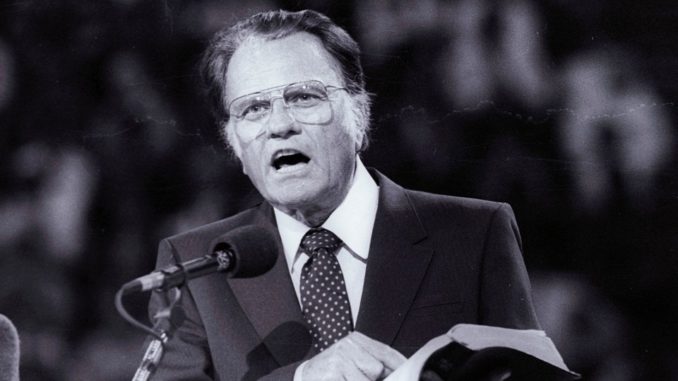
Reverend Billy Graham, the influential Southern preacher who became a spiritual advisor to several US presidents and millions of Americans via their television sets, has died, his family said Wednesday. He was 99.
The one-time backwoods minister who eventually became the world’s foremost Christian evangelist, spread a message of spiritual redemption at tent and stadium revival meetings, in a career that spanned decades.
“Billy Graham is the closest thing to a national pope that we shall ever see,” journalist Garry Wills once wrote in The Washington Post.
Graham was a pioneer of “televangelism” to convert souls to Christianity as television got off the ground in the 1950s.
Born on November 7, 1918, he was raised as one of four children on a dairy farm in Charlotte, North Carolina.
Graham had a spiritual awakening in 1934 that changed the course of his life. He subsequently attended the Florida Bible Institute, now Trinity College of Florida, and was ordained as a Baptist minister in 1939.
In 1950, he founded the Billy Graham Evangelistic Association (BGEA) in Minneapolis, Minnesota and launched a weekly “Hour of Decision” radio program.
Graham and his wife Ruth Bell Graham — the daughter of a missionary surgeon who grew up in China — had five children.
These include Anne Graham Lotz, a Christian author and speaker, and two sons, who like their famous father became ministers.
One son, William Franklin Graham III is now the head of the Billy Graham Evangelistic Association.
His wife Ruth, although married for nearly 64 years to the world’s most famous Baptist preacher, remained a lifelong Presbyterian. She died in June 2007 at the age of 87.
Unlike other high-profile evangelists, Graham managed to escape sex and money scandals by keeping a meticulous watch over his staff and finances.
“My greatest fear is that I’ll do something that will bring disrepute on the Gospel of Christ before I go,” Graham said in a 1991 interview.
He suffered from a host of ailments late in life, including Parkinson’s disease and prostate cancer. In 1995, weakened by illness and old age, he turned over operation of his ministry to his eldest son.